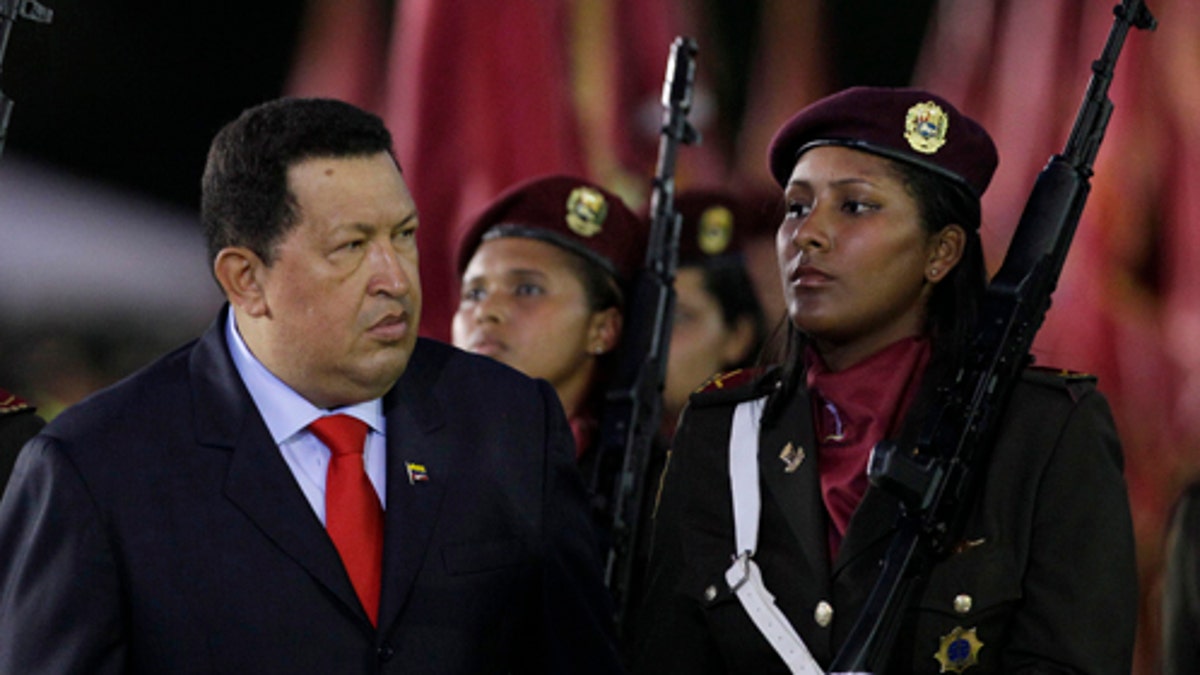
Venezuela's President Hugo Chavez attends a military ceremony marking the 75th anniversary of the creation of the Bolivarian National Guard at Fuerte Tiuna military base in Caracas, Venezuela, Friday, Aug. 10, 2012. (AP Photo/Ariana Cubillos) (AP2012)
Venezuela became the the newest member of the U.N. General Assembly's Human Rights Council, sparking outrage among critics of Venezuelan President Hugo Chávez who believe the country has no right on the council.
Other countries human rights groups have criticized as unqualified candidates are Ivory Coast, Ethiopia, Gabon, Kazakhstan and Pakistan.
On Monday, Venezuela's U.N. Ambassador Jorge Valero said the country's efforts to become a member of the council had "unleashed a truly unusual campaign."
"It's important to emphasize that Venezuela has committed itself to defend the sovereignty and liberty of people," Valerio said in an apparent allusion to Chavez's comments that Venezuela would oppose any actions or aggressions against allied countries such as Syria or Cuba.
The inclusion of Venezuela brought criticism from House Foreign Affairs Committee Chairwoman Ileana Ros-Lehtinen (R-Florida) who called on the administration to break its ties to the council -- and to cut funding for it -- because it chose to accept countries that constantly violate basic human rights.
“The Obama Administration should stop making excuses for the UN Human Rights Council, which remains as dictator-friendly as ever, despite three years of U.S. membership and funding,” Ros-Lehtinen said in July. “However you want to spin short-term tactical victories, the long-term trajectory of the Council is still pro-rogue regimes and anti-human rights.”
The five Western nations competing for seats were all deemed qualified by the rights groups as was Estonia, which was elected from the Eastern Europe group. The countries begin three-year terms on Jan. 1, 2013.
As widely expected, the United States was also re-elected to the council. Jamil Dakwar, the director of the American Civil Liberties Union's Human Rights Program, welcomed the U.S. re-election.
The Human Rights Council was created in March 2006 to replace the U.N.'s widely discredited and highly politicized Human Rights Commission. But the council has also been widely criticized for failing to change many of the commission's practices, including putting much more emphasis on Israel than on any other country and electing candidates accused of serious human rights violations.
Among those leaving the 47-member council at the end of this year are China, Cuba and Russia.
In the case of Venezuela, critics say President Hugo Chávez accumulated near-absolute power over the past decade thanks to his control of the National Assembly and the media, friendly judges in the courts, and pliant institutions such as the Central Bank. “Venezuela under Mr. Chávez has no place at this table,” said the Washington Post in its editorial page Sunday.
Chávez, who last month won one of the closest elections in Venezuela's history, announced in July his decision to pull out Venezuela from the American Convention on Human Rights, considered one of the pillars of the legal regulations aimed at defending human rights in the Americas. The announcement was followed a few days later by a Human Rights Watch report stating that Venezuelan government "freely intimidates, censors and prosecutes its critics."
Amnesty International's U.N. representative, Jose Luis Dias, said member states "should return a blank ballot if they feel a candidate does not meet the high human rights standards expected of council members."
Former President George W. Bush's administration boycotted the council when it was established over its repeated criticism of Israel and its refusal to cite flagrant rights abuses in Sudan and elsewhere. But in 2009, then newly elected President Barack Obama sought to join the council saying the U.S. wanted to help make it more effective.
Based on reporting by The Associated Press.
Follow us on twitter.com/foxnewslatino
Like us at facebook.com/foxnewslatino
